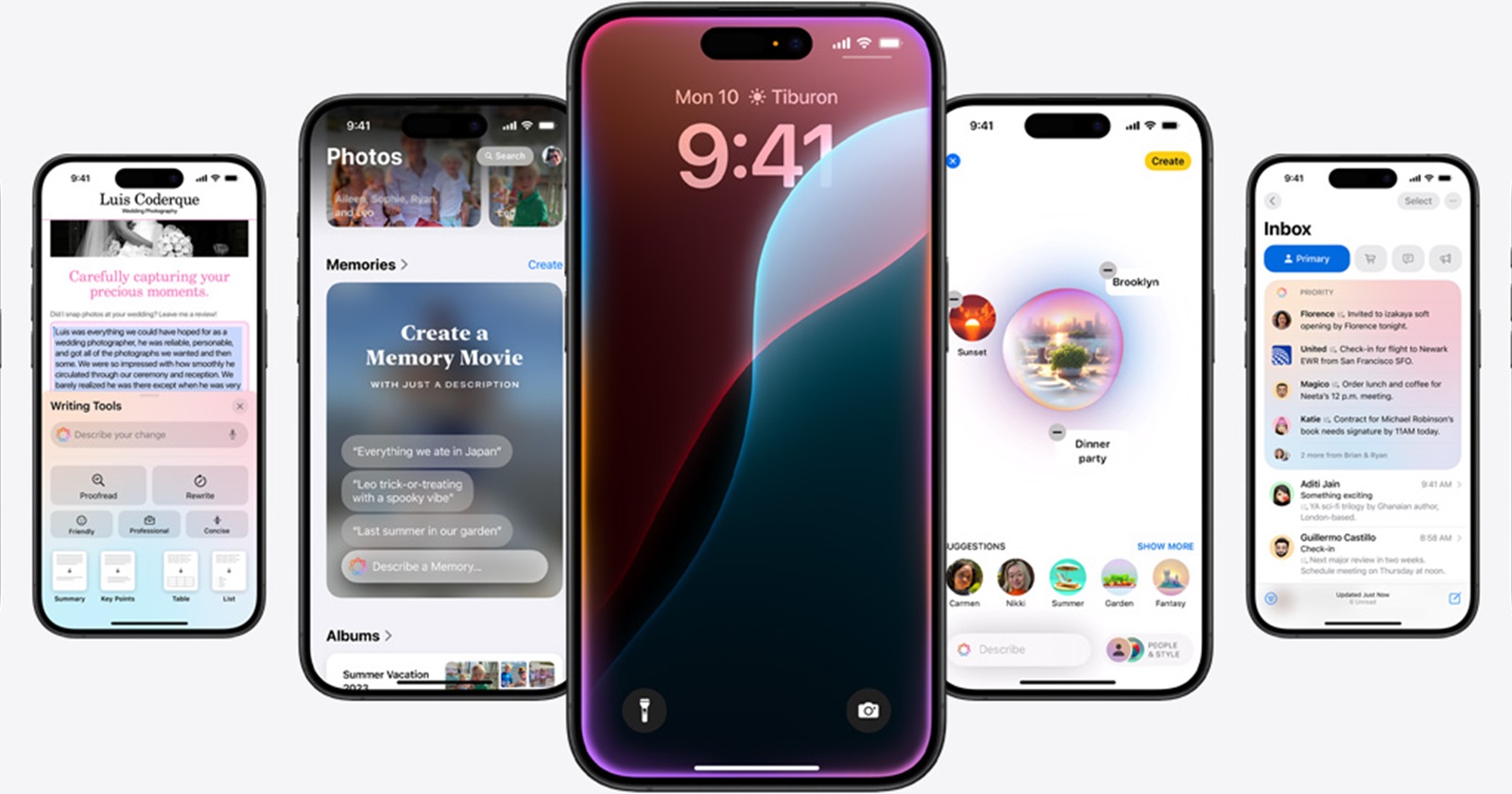Apple Intelligence is only available on iPhone 15 Pro? Is it a hardware integration? pic.twitter.com/BYL769EYf9
— Peter Yang (@petergyang) June 10, 2024
Apple’s recent announcement of Apple Intelligence — aptly shortened as AI — a suite of AI-powered features for iPhones, iPads, and Macs, has ignited both excitement, controversy and disappointment from various sections of users. While the features promise to enhance user experiences, the exclusion of non-Pro iPhone 15 models and older devices is stirring up a storm. While the possible reasons behind these decisions might be justified by hardware limitations, consumers who shelled out $799+ for their devices will be far from pleased.
This move echoes Google’s initial decision to skip Gemini Nano support on the non-Pro Pixel 8, which was met with criticism for potentially breaking their 7-year update pledge. Google later backtracked, citing lower memory capacity as the reason for the omission. Now, Apple finds itself in a similar predicament.
Google’s misstep and swift recovery
When Google launched the Pixel 8 without Gemini Nano support, the backlash was swift and fierce. Critics used this as evidence to argue that Google’s seven-year update pledge was already faltering. Google’s rationale was that the Pixel 8’s lower memory capacity would lead to a degraded user experience if the AICore system service was kept persistently in memory. Realizing the storm of discontent, Google quickly backtracked and promised to rectify the issue.
The Verge even published an article acknowledging the power of public shaming. “We did it, y’all,” read the article’s first line. “We bullied Google into letting the Pixel 8 run on-device AI.” While this technique worked for Google, Apple isn’t particularly known to listen to what people want. They do what they feel is right for the people, so bullying Apple into supporting Apple Intelligence on non-Pro iPhone 15 and older models might not work the same way it did with Google.
A scheme to drive up iPhone 15 Pro and Pro Max sales
While the non-Pro iPhone 15 models boast 6GB of RAM and the A16 chip, it’s possible these are insufficient for the demanding on-device AI models of Apple Intelligence. The Pro models, with 8GB of RAM and the A17 Pro chip, are deemed capable. This was pretty much the same story with Google Pixel 8 and 8 Pro, where the latter boasts 12GB RAM while the former has 8GB RAM. With Samsung having made Galaxy AI available for Galaxy S24 users with 8GB RAM, Pixel 8 users saw hardware limitation as a mere excuse from Google.
The situation becomes even more intriguing when we consider Apple’s main rival, Samsung. They extended support for Galaxy AI to older devices, including the Galaxy S21 series, demonstrating a commitment to broader accessibility. The absence of Apple Intelligence on devices like the iPhone 14 Pro Max that are still in top condition in 2024 further raises eyebrows. In fact, it justifies the speculations that Apple is intentionally segmenting Apple Intelligence features to drive up sales of the iPhone 15 Pro and Pro Max, a strategy that could backfire if users perceive it as unfair. If Samsung can extend Galaxy AI features to older devices with the One UI 6.1 update, Apple should be able to do the same with the update to iOS 18.
iPhone 15 and 15 Plus, released 8 months ago, will not get Apple Intelligence
— Anthony (@TheGalox_) June 10, 2024
For comparison, the 3 year old Galaxy S21 series revieved Galaxy AI pic.twitter.com/wIxYvZFXLX
I really want to believe the hardware argument. But in the hindsight, Apple’s decision appears to be more strategic than technical. By reserving exclusive features for the Pro models, Apple creates a compelling reason for consumers to opt for the higher-end devices. This strategy isn’t new; tech companies often use it to drive sales of their premium products. However, the exclusion of the iPhone 14 Pro Max, a device still considered top-performing in 2024, from these new features suggests that hardware may not be the only factor at play.
Apple’s loyal fanbase is divided. Some argue that the company is simply maximizing its hardware capabilities, while others feel that Apple is deliberately withholding features to boost Pro model sales. With rumors suggesting that the entire iPhone 16 lineup will come with 8GB of RAM, there is hope that Apple Intelligence will eventually be available across all models. However, until then, non-Pro users will feel the sting of missing out on the latest AI advancements.
Will Apple Intelligence continue to be a Pro-exclusive feature?
Apple’s loyal fanbase is divided. Some argue that the company is simply maximizing its hardware capabilities, while others feel that Apple is deliberately withholding features to boost Pro model sales. With rumors suggesting that the entire iPhone 16 lineup will come with 8GB of RAM, there is hope that Apple Intelligence will eventually be available across all models. Still, the iPhone 16’s 8GB RAM may still be short of the required raw power to fully run on-device LLMs.
Historically, memory hasn’t been a major concern for iPhone users, thanks to Apple’s high-performance chips and the streamlined iOS operating system, which consistently deliver top-notch performance despite varying RAM capacities. However, the advent of resource-intensive AI tools raises the question of whether this trend will hold true in the new era of AI-powered devices. But for now, non-Pro users will feel the sting of missing out on the latest AI advancements.
IPhone 15 doesn’t get Apple intelligence wow.
— Rjey (@RjeyTech) June 10, 2024
In the end, the success of Apple Intelligence hinges on striking a balance between innovation and inclusivity. While technical limitations might justify the initial exclusions, Apple must carefully consider the impact on user satisfaction and brand loyalty. After all, in the world of tech, perception is often as important as reality.
Will Apple experience the same level of outrage as Google did? Only time will tell. However, the debate over Apple Intelligence highlights the complex challenges companies face in bringing cutting-edge AI features to a wide range of devices while balancing performance, cost, and user expectations.
For now, it appears that Apple’s strategy is to use Apple Intelligence as a selling point for its Pro models. Whether this will change with future updates and devices remains to be seen. One thing is certain: consumers are paying close attention, and their expectations are higher than ever.
TechIssuesToday primarily focuses on publishing 'breaking' or 'exclusive' tech news. This means, we are usually the first news website on the whole Internet to highlight the topics we cover daily. So far, our stories have been picked up by many mainstream technology publications like The Verge, Macrumors, Forbes, etc. To know more, head here.


